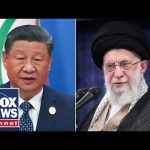Rescue crews are hard at work in Haifa, Israel, after an Iranian missile struck the area. The situation is tense as teams are focused on ensuring that anyone who may need help is found and treated swiftly. Meanwhile, over in the United States, a familiar face is at the center of discussions about how to respond to this escalating situation. President Trump is keeping the possibility of a diplomatic solution with Iran on the table, but the clock is ticking. He has promised to decide within two weeks regarding possible military action against Iran.
The backdrop of this developing story is critical. According to some political analysts, President Trump has been quite clear about his ultimate goal: dismantling and destroying Iran’s nuclear program. Time has run out for negotiations, as the deadline Trump set has passed. Now, it seems to be a race against time, with eyes on the implications of Israel’s military actions against Iranian facilities. The tension in the region is palpable, and the stakes could not be higher.
There seems to be little appetite for a ceasefire in this escalating conflict. President Trump has made it clear that he is not interested in what he describes as a mere break to regroup; rather, he is advocating for “total and complete victory” to ensure that Iran does not develop nuclear capabilities. The importance of this stance is emphasized by polling data indicating that a large portion of the Republican electorate backs a strong stance against Iran. Up to 90% of Republican voters believe that Iran must not have nuclear weapons, underscoring solid support for Trump’s hardline policies.
Interestingly, some analysts have suggested that there is a disconnect between Trump and certain factions within the Republican Party. However, most evidence, including fresh polls, suggests that the MAGA movement remains firmly behind Trump on the issue of Iran. The crux of the matter appears to be that while there may be occasional whispers of dissent, most Republicans prioritize national security and unequivocally support strong measures against Iran’s nuclear ambitions.
In the broader context of the Middle East, there are concerns about the so-called “Axis of Resistance,” which traditionally included Iran-backed militias and other allied factions. These groups, once considered a significant threat, seem to have been weakened considerably since the escalation of tensions. Ironically, many of these militant groups have kept a low profile lately, possibly assessing the situation just as much as world leaders are. Thus far, any notions of widespread retaliation seem unfounded, as the regional dynamics continue to shift in response to military actions and alliances.
With U.S. troops already stationed in the Middle East, the decision-making process for President Trump and his administration could bear significant consequences. Critics argue about the burden of another military engagement, but supporters maintain that it is crucial to act decisively against Iran to prevent a greater catastrophe down the line. As the situation continues to unfold, all eyes are on Washington and the looming deadline for Trump’s decision on how to approach Iran. The coming weeks may prove to be pivotal—who knows what new developments might arise in this volatile landscape? Whatever the outcome, the focus remains on achieving security and a stable future free from nuclear threats.




